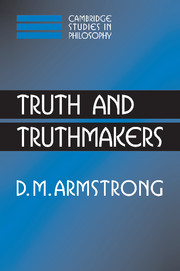Book contents
- Frontmatter
- Contents
- Preface
- 1 An introduction to truthmakers
- 2 The general theory of truthmaking
- 3 Epistemology and methodology
- 4 Properties, relations and states of affairs
- 5 Negative truths
- 6 General truths
- 7 Truthmakers for modal truths, part 1: possibility
- 8 Truthmakers for modal truths, part 2: necessity
- 9 Numbers and classes
- 10 Causes, laws and dispositions
- 11 Time
- References
- Index
8 - Truthmakers for modal truths, part 2: necessity
Published online by Cambridge University Press: 22 September 2009
- Frontmatter
- Contents
- Preface
- 1 An introduction to truthmakers
- 2 The general theory of truthmaking
- 3 Epistemology and methodology
- 4 Properties, relations and states of affairs
- 5 Negative truths
- 6 General truths
- 7 Truthmakers for modal truths, part 1: possibility
- 8 Truthmakers for modal truths, part 2: necessity
- 9 Numbers and classes
- 10 Causes, laws and dispositions
- 11 Time
- References
- Index
Summary
So much for truthmakers for truths of possibility. Our task now is to tackle the more difficult problem of necessary truths.
AGAINST EXTENSIONAL ACCOUNTS OF NECESSITY
We will begin, however, by criticizing extensional accounts of necessity. Let us temporarily assume modal realism, the real existence of the Lewisian pluriverse which contains all possible worlds. If one tries to combine this assumption with the acceptance of truthmaker theory, then presumably one must say that necessary truths are those that have truthmakers in every world. For certain necessary truths we might wish to limit the worlds to ones that contain the entities that are involved in this truth. Thus, for the truth that 7 + 5 = 12, we might restrict the worlds to those that contain at least twelve entities because smaller worlds, if there are such possible worlds, seem to furnish no truthmakers for this truth. But this restriction seems not particularly important here.
We pose once again that wonderful dilemma: the Euthyphro question. In the dialogue of that name, Socrates asks whether the piety of certain actions is constituted by the fact that the gods love these actions, or whether instead the acts are independently pious and therefore are loved by the gods. In the same sort of way, we can ask whether the necessity of a particular necessary truth is constituted by the fact that it has a truthmaker in all possible worlds, or whether instead the truth is independently necessary and therefore it has a truthmaker in all these worlds.
- Type
- Chapter
- Information
- Truth and Truthmakers , pp. 95 - 111Publisher: Cambridge University PressPrint publication year: 2004



